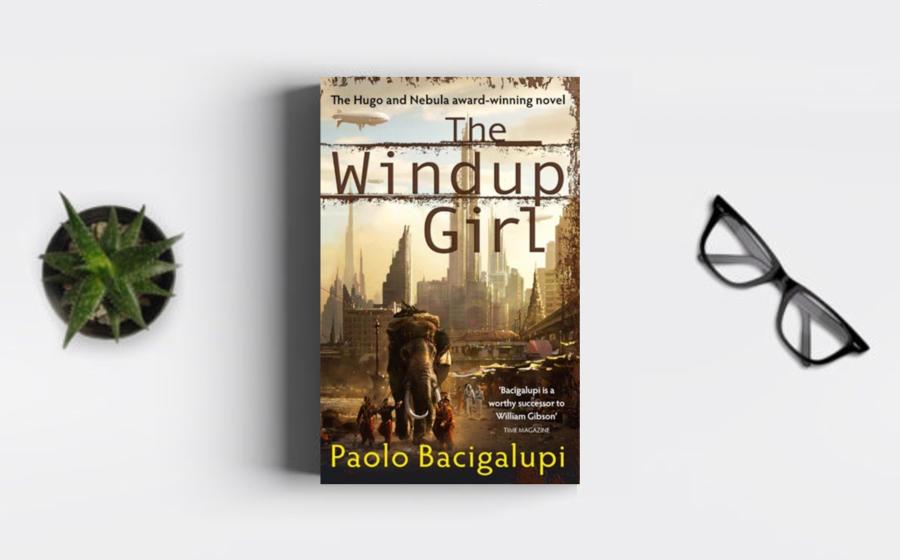"The Windup Girl," published in 2009, readers are
transported to a vividly imagined future where
bioengineering and corporate greed shape a dystopian
landscape. This groundbreaking work of science fiction
not only delves into the environmental and social
consequences of biotechnology but also challenges
conventional notions of humanity, power, and morality.
Through a meticulously crafted narrative set in a
post-oil world, Bacigalupi introduces readers to a
future Bangkok where biologically engineered beings,
including the titular Windup Girl, navigate a world rife
with political intrigue, economic exploitation, and
ecological collapse.
The novel unfolds in a
near-future world where fossil fuels have been depleted,
and biotechnology has become the new source of power.
Corporations control genetically modified crops and
create bioengineered beings called "New People" to serve
various functions, from labor to entertainment. Against
this backdrop, the city-state of Bangkok struggles to
maintain its independence in a world dominated by
biotech conglomerates and their genetically modified
products.
At the heart of the narrative is Emiko,
the Windup Girl, a bioengineered being created to serve
as a compliant and subservient laborer. As the story
unfolds, readers are confronted with the ethical
implications of creating beings with artificial
intelligence and emotions, prompting reflection on the
nature of consciousness, free will, and the
responsibility of humanity towards its creations.
One of the groundbreaking elements of "The Windup
Girl" is its exploration of biopunk - a subgenre of
science fiction that focuses on the societal impacts of
biotechnology. Bacigalupi's vision of a world powered by
genetically modified organisms, where biotechnology has
become both a savior and a curse, adds a layer of
complexity to the narrative. The novel engages with
contemporary debates surrounding genetic engineering,
environmental sustainability, and corporate control over
the food supply, making it a prescient work that
anticipates real-world ethical dilemmas.
The
portrayal of biologically engineered beings like the
Windup Girl raises profound questions about the ethics
of creating and exploiting sentient entities. Emiko,
designed to be compliant and subservient, becomes a
symbol of the dehumanizing effects of bioengineering.
Her struggles for autonomy and acceptance in a society
that views her as a commodity force readers to confront
the moral consequences of manipulating life for human
benefit. This ethical dimension sets "The Windup Girl"
apart as a work that transcends the boundaries of
traditional science fiction, inviting readers to grapple
with the moral implications of technological progress.
Bacigalupi's world-building is meticulous and
immersive, painting a picture of a future Bangkok where
biotechnology permeates every aspect of life. The author
seamlessly integrates Thai culture into the narrative,
creating a setting that feels both futuristic and rooted
in the rich traditions of the past. The authenticity of
the world he creates contributes to the novel's impact,
offering readers a thought-provoking glimpse into a
possible future shaped by the choices humanity makes
today.
The novel's exploration of environmental
collapse and the consequences of unchecked corporate
power is another groundbreaking aspect. Bacigalupi
envisions a world where climate change, resource
depletion, and ecological disasters have reshaped the
geopolitical landscape. The stranglehold of biotech
corporations on the world's food supply and energy
sources mirrors contemporary concerns about the
environmental impact of unchecked technological
advancement and the concentration of power in the hands
of a few influential entities.
"The Windup Girl"
also challenges traditional narratives of heroism and
idealism. The characters in the novel are morally
ambiguous, navigating a world where survival often
requires compromise and sacrifice. Bacigalupi's refusal
to provide easy answers or clear-cut heroes adds depth
to the narrative, reflecting the complexities of
real-world dilemmas. This departure from conventional
storytelling tropes elevates the novel to a more
sophisticated level, contributing to its groundbreaking
status within the science fiction genre.
The
novel's critical engagement with themes of power and
exploitation extends to its portrayal of political and
economic systems. Bacigalupi presents a world where
multinational corporations wield immense influence over
governments, shaping policies and manipulating markets
for their benefit. This exploration of corporate
dominance and its impact on society aligns with
contemporary concerns about the role of powerful
corporations in shaping political and economic
landscapes.
Bacigalupi's narrative structure,
featuring multiple perspectives that converge over the
course of the novel, adds to its complexity. By weaving
together the stories of different characters, each with
their own motivations and struggles, the author creates
a tapestry of interconnected narratives that contribute
to a fuller understanding of the novel's themes. This
multifaceted approach to storytelling enhances the
reader's immersion in the world of "The Windup Girl" and
allows for a more nuanced exploration of its
socio-political and ethical dimensions.
The
novel's impact extends beyond its literary achievements,
influencing discussions in the fields of science,
ethics, and speculative fiction. Bacigalupi's
exploration of biotechnology and its consequences has
resonated with scientists and ethicists grappling with
the ethical implications of genetic engineering and
artificial intelligence. The novel's success has also
contributed to the popularity of biopunk as a subgenre,
inspiring other writers to engage with the ethical and
social dimensions of biotechnology in their works.
"The Windup Girl" is a groundbreaking work of science fiction that transcends the genre's conventions. Paolo Bacigalupi's exploration of biopunk, the ethical dilemmas of biotechnology, and the consequences of unchecked corporate power sets the novel apart as a thought-provoking and prescient work. Its impact on discussions surrounding genetic engineering, environmental sustainability, and corporate influence, coupled with its meticulous world-building and refusal to adhere to traditional storytelling tropes, cements its place as a seminal work that challenges readers to confront the complexities of the future.






